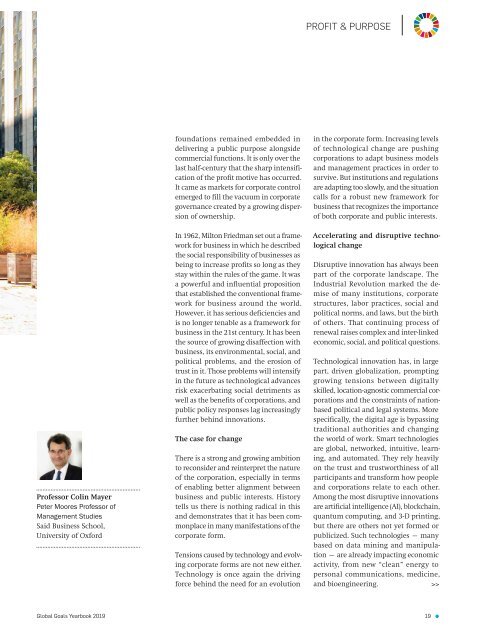Aliging Profit with Purpose - Global Goals Yearbook 2019
What are companies for? The rules for companies have changed. The focus is increasingly on their sustainable, social, and ecological impacts. The strategic orientation toward the so-called corporate purpose is decisive for profitable growth in the future. This currently results in a large number of questions for businesses: How do you find an inspiring and future-oriented corporate purpose, and how can it be aligned in such a way that it brings profitable growth and social responsibility in concert? The new 2019 edition of the Global Goals Yearbook offers answers to these crucial questions thanks to its consistent orientation toward the UN Sustainable Development Goals and a competent editorial board and author pool.
What are companies for? The rules for companies have changed. The focus is increasingly on their sustainable, social, and ecological impacts. The strategic orientation toward the so-called corporate purpose is decisive for profitable growth in the future.
This currently results in a large number of questions for businesses: How do you find an inspiring and future-oriented corporate purpose, and how can it be aligned in such a way that it brings profitable growth and social responsibility in concert? The new 2019 edition of the Global Goals Yearbook offers answers to these crucial questions thanks to its consistent orientation toward the UN Sustainable Development Goals and a competent editorial board and author pool.
You also want an ePaper? Increase the reach of your titles
YUMPU automatically turns print PDFs into web optimized ePapers that Google loves.
PROFIT & PURPOSE<br />
Professor Colin Mayer<br />
Peter Moores Professor of<br />
Management Studies<br />
Said Business School,<br />
University of Oxford<br />
foundations remained embedded in<br />
delivering a public purpose alongside<br />
commercial functions. It is only over the<br />
last half-century that the sharp intensification<br />
of the profit motive has occurred.<br />
It came as markets for corporate control<br />
emerged to fill the vacuum in corporate<br />
governance created by a growing dispersion<br />
of ownership.<br />
In 1962, Milton Friedman set out a framework<br />
for business in which he described<br />
the social responsibility of businesses as<br />
being to increase profits so long as they<br />
stay <strong>with</strong>in the rules of the game. It was<br />
a powerful and influential proposition<br />
that established the conventional framework<br />
for business around the world.<br />
However, it has serious deficiencies and<br />
is no longer tenable as a framework for<br />
business in the 21st century. It has been<br />
the source of growing disaffection <strong>with</strong><br />
business, its environmental, social, and<br />
political problems, and the erosion of<br />
trust in it. Those problems will intensify<br />
in the future as technological advances<br />
risk exacerbating social detriments as<br />
well as the benefits of corporations, and<br />
public policy responses lag increasingly<br />
further behind innovations.<br />
The case for change<br />
There is a strong and growing ambition<br />
to reconsider and reinterpret the nature<br />
of the corporation, especially in terms<br />
of enabling better alignment between<br />
business and public interests. History<br />
tells us there is nothing radical in this<br />
and demonstrates that it has been commonplace<br />
in many manifestations of the<br />
corporate form.<br />
Tensions caused by technology and evolving<br />
corporate forms are not new either.<br />
Technology is once again the driving<br />
force behind the need for an evolution<br />
in the corporate form. Increasing levels<br />
of technological change are pushing<br />
corporations to adapt business models<br />
and management practices in order to<br />
survive. But institutions and regulations<br />
are adapting too slowly, and the situation<br />
calls for a robust new framework for<br />
business that recognizes the importance<br />
of both corporate and public interests.<br />
Accelerating and disruptive technological<br />
change<br />
Disruptive innovation has always been<br />
part of the corporate landscape. The<br />
Industrial Revolution marked the demise<br />
of many institutions, corporate<br />
structures, labor practices, social and<br />
political norms, and laws, but the birth<br />
of others. That continuing process of<br />
renewal raises complex and inter-linked<br />
economic, social, and political questions.<br />
Technological innovation has, in large<br />
part, driven globalization, prompting<br />
growing tensions between digitally<br />
skilled, location-agnostic commercial corporations<br />
and the constraints of nationbased<br />
political and legal systems. More<br />
specifically, the digital age is bypassing<br />
traditional authorities and changing<br />
the world of work. Smart technologies<br />
are global, networked, intuitive, learning,<br />
and automated. They rely heavily<br />
on the trust and trustworthiness of all<br />
participants and transform how people<br />
and corporations relate to each other.<br />
Among the most disruptive innovations<br />
are artificial intelligence (AI), blockchain,<br />
quantum computing, and 3-D printing,<br />
but there are others not yet formed or<br />
publicized. Such technologies – many<br />
based on data mining and manipulation<br />
– are already impacting economic<br />
activity, from new “clean” energy to<br />
personal communications, medicine,<br />
and bioengineering.<br />
>><br />
<strong>Global</strong> <strong>Goals</strong> <strong>Yearbook</strong> <strong>2019</strong><br />
19

















